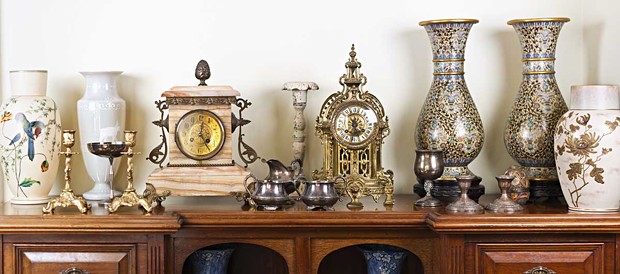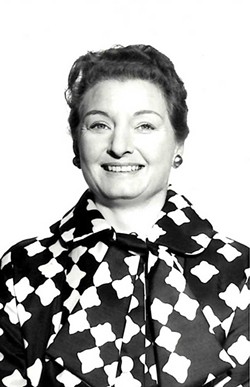Five Ways to Honor the Departed
Without keeping all their junk
By Linda Stansberry [email protected] @lcstansberry[
{
"name": "Top Stories Video Pair",
"insertPoint": "7",
"component": "17087298",
"parentWrapperClass": "fdn-ads-inline-content-block",
"requiredCountToDisplay": "1"
}
]
The last joke my grandmother told was a yellowed newspaper clipping, left in an envelope in her desk drawer for us to find after she died. It was a humor essay by a man who described the effort it took in his life to accumulate all his possessions, and how little fun it would be for his kids to go through them once he had passed on. I wish I could remember the writer's name and the title of the essay, but I'm pretty sure that the clipping, along with many of the other things she left behind, was thrown away. She would have been proud.
Gram was scrupulous to the point of morbidity about winnowing down her possessions before she died. She encouraged her grandkids to rifle through her jewelry boxes when we came to visit, and to use Post-its to put our names on the things we wanted.
"I don't want you fighting over this stuff once I'm dead," she'd tell us. To her credit, we didn't.
But cleaning out her small home once she had gone was still a challenge, made more difficult by the exhaustion of grief. I took some of the artwork, my brothers the furniture, my mother and uncle the family heirlooms. What was left was mostly knickknacks and household goods, the stuff you can't part with in life but do little good after death. Although it felt like a desecration, many of them went to second-hand stores or into the garbage. But there were some that I couldn't get rid of, like her lapel pins from the Ladies Auxiliary and the spare bedroom sheets that miraculously retain the scent of her brand of fabric softener four years later.
I still occasionally bury my face in those sheets to resurrect a flurry of sense memories: the sound of her voice, the feeling of her rubbing Vick's VapoRub on my chest when I was young and sick. But for the boxes of her things that I lugged to my own small house, I've developed a different set of skills to make peace with letting them go. Here is what I've learned.
You can retrain your memory
Remembering the negative rather than the positive is a feature in humans, not a bug. Psychologists theorize our focus on emotional or physical trauma is an evolutionary advantage, teaching us not to touch hot stoves or stay with mean people. But, in hindsight, I wish I had learned to store more positive memories of my grandmother rather than all of those times she asked me to lose weight. Luckily, the brain is plastic and there are several ways to retrain it to remember the good things. (If your relative is just plain mean, you, of course, have my permission to think as negatively about them as you'd like.) The method I prefer is the finger-thumb method. At the end of each day, assign each finger a positive memory or thought: something good that happened that day, the life accomplishment you're most proud of, something you're grateful for, a future goal. Rub each finger against your thumb in turn, focusing on the memory or thought. Make a habit out of this, and you'll soon have a bank of positive thoughts and memories to rely on. Much more useful than that drawer of lacy tea towels you'll never use.
Share a legacy
Some of the hardest things to get rid of when you're liquidating an estate are the things that are a) not valuable b) have no sentimental value but c) seem somehow too important to just get rid of. Then again, I'm a sentimental fool who sniffles when I see stranger's family photos or children's gifts at secondhand stores. One solution is to see if your local museum could use them. I recently reached out to the Clarke Museum to see if the folks there had a place for Gram's lapel pins (they did). It feels good to know that they will be contextualized, valued and cared for.
Cook their food
Some families cook together but the women in my family prefer to martyr away by the stove alone, taking advantage of the "no kids in the kitchen" rule to get a few minutes of precious solitude. So I didn't learn Gram's recipes by her side but rather rediscovered them when I inherited her cookbooks and recipe cards. It felt surprisingly intimate to go through the cards with recipes for macaroni salad and "beau catcher" cookies, with notes at the top detailing which sister or bridge partner she had gotten them from. The cookbooks, when arranged chronologically, spanned almost a century of cuisine, from a broth-spattered Boston cookbook that belonged to my great-grandmother, a Home Ec collection from the '60s with hundreds of gelatin-based dishes, to an unopened pamphlet on microwave cuisine. Sometimes I'll find a note in her handwriting in the margins, like the words "Good!" above a recipe for Greek lamb stew, and it will send a little shock of pleasure and sadness through me. The Ferndale Museum has asked its members to submit pies made from family recipes this May for a Mother's Day raffle. I was tapped to make Gram's signature cream cheese pie. It's a weighty responsibility but my family and friends have agreed to help eat the practice pies as I perfect my attempt at her legacy.
Keep their secrets
Sunlight is the best disinfectant and most family secrets (alcoholism, mental illness, adoption) are best aired. But the other secrets, the evidence of a private life you might find in a shoebox at the back of a closet, in diaries or medicine cabinets, do no harm left untold. Keeping some secrets is the last, best favor you can do for your loved ones after they've passed.
Smile in your photographs
We have only had photography for about 200 years and among them only a few golden decades where the technology was both widely accessible and the subject wasn't compelled to sit formally with a stiff mouth. Sadly, many of my favorite people refuse to be photographed because they don't like their hair, their teeth or their figures. I sympathize. I'm frequently self-conscious about all those things. But I have made a point of showing up and smiling in photographs, because I know that whoever keeps my photograph on their wall once I've passed won't care about my bad teeth or messy hair, they're just going to want to remember me as confident and happy. And I know that when Gram tucked away that newspaper clipping, she was picturing my mother and me, discovering it and laughing. She would be happy if she knew that when I remember her, I smile.
Linda Stansberry is a staff writer at the Journal. Reach her at 442-1400, extension 317, or [email protected]. Follow her on Twitter @LCStansberry.
Read more personal essays on www.northcoastjournal.com. Have your own story to tell? Email [email protected].
Comments (3)
Showing 1-3 of 3
more from the author
-
Lobster Girl Finds the Beat
- Nov 9, 2023
-
Tales from the CryptTok
- Oct 26, 2023
- More »



































